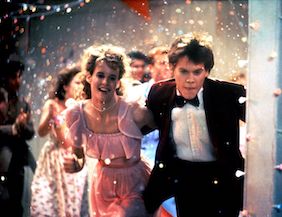The Number One Movie in America: Footloose
By Sean Collier
June 26, 2021
BoxOfficeProphets.com

Among 1980s dance-focused romps, that’s a bit of an exception.
The tale of a small town where dancing is illegal is based on the real-life story of Elmore City, Oklahoma, home to less than 1,000 people and one high school. Until 1980 — that’s right, a mere four decades ago — the town did not permit public dancing, under a preacher’s insistence that “no good has ever come from a dance.” At the dawn of the ’80s, a group of enterprising high school students petitioned the rhythm-adverse town council for the right to have a junior prom.
They got their wish. As far as I can tell, school shindigs have continued in Elmore City ever since, with relatively little moral degradation.
The film, meanwhile, rode its soundtrack to hearty returns, en route to becoming a beloved (if not particularly impressive) slice of teen culture. Released in the cinematically sleepy February of 1984, “Footloose” won three weekends amid slim competition before ceding the top spot to the debuting “Splash.” It would remain in the Top 10 more or less uninterrupted until June, finishing as the 7th top-grossing film of the year.
In blockbuster-soaked 1984, that was quite an achievement. The only films to do better were goliaths: “Beverly Hills Cop,” “Ghostbusters,” “Indiana Jones and the Temple of Doom,” “Gremlins” and “The Karate Kid.” (And, surprisingly, “Police Academy.”) The $80 million cume for “Footloose” would roughly translate to about $205 million today — not bad for a movie that doesn’t have a plot to speak of.
It’s a soundtrack-first project, after all. The album, featuring nine pop hits written for the film, went to number one. So did two of its singles, the title track and “Let’s Hear it For the Boy.” Both of those songs would be nominated for the Best Original Song Oscar, alongside “Ghostbusters,” “Against All Odds” and “I Just Called to Say I Love You.” (In a forgotten bit of Oscars ignominy, “I Just Called to Say I Love You” somehow managed to win.) The song “Footloose” is heard no less than three times, in full, during the film — a fact that helped propel the album to 9x Platinum status.
As was the case with “Purple Rain,” “Saturday Night Fever” and other semi-musicals of the era, success of film and soundtrack went hand in hand. A lineup of appealing teen stars — not merely Kevin Bacon, but Lori Singer (who beat out a laundry list of stars for the part), a young Sarah Jessica Parker and a surprisingly charming Chris Penn among them — helped draw in young audiences, with John Lithgow present to bring up the dramatics. (Dianne Wiest is quite good as the wife of Lithgow’s conflicted preacher, but she isn’t given much to do.)
To stop hinting at it: While “Footloose” is fun, it’s not very good. Its story is a dud, mixing the right-to-dance narrative with a tacked-on love triangle and padding the run time with dance-training montages and an extended tractor-fight sequence. Even the part of the story you remember isn’t actually of consequence; in the filmed version, the kids’ earnest appeal does not get the dancing ban overturned. Lithgow’s preacher eventually gives his blessing, but only after it becomes clear that no laws need be changed. The ultimate school dance is held over the town line, rendering much of what came before irrelevant.
If you actually sit down to watch “Footloose” beginning to end, you’ll be surprised at its length and the number of scenes that don’t really click. Afterward, though, you’ll mainly remember the gymnastics — and the tunes. There’s a reason Kenny Loggins keeps getting played again and again. That’s what we’re here for.
“Footloose” is the subject of the latest episode of The Number One Movie in America, a look back at past box-office champions. Each episode’s film is drawn at random from a list of every number-one movie since 1977. Please listen and subscribe!
Next time: Sometime after “Goodfellas,” Joe Pesci decided to amuse himself by interfering with the education of one Brendan Fraser.